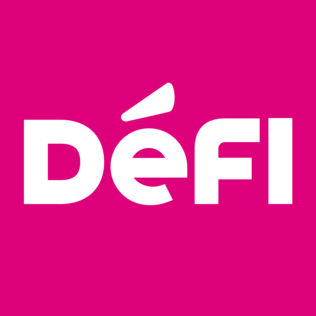Top Qs
Timeline
Chat
Perspective
DéFI
Political party in Belgium From Wikipedia, the free encyclopedia
Remove ads
DéFI ([defi] ⓘ), a backronym of Démocrate fédéraliste indépendant ([demɔkʁat fedeʁalist ɛ̃depɑ̃dɑ̃]) is a regionalist[8][9][1] and social-liberal[1][6][2] political party in Belgium mainly known for defending French-speakers' interests in and near the Brussels region.[10][11] Founded in 1964, the party is led by Sophie Rohonyi, a former member of the Chamber of Representatives. The party's current name, DéFI or Défi, was adopted in 2016 and is a backronym of Démocrate, Fédéraliste, Indépendant (lit. 'Democratic, Federalist, Independent') meaning "challenge" in French.
Remove ads
History
Summarize
Perspective
The party was founded as the Democratic Front of Francophones (Front Démocratique des Francophones, FDF) on 11 May 1964 as a response to the language laws of 1962. The party had instant success in Brussels: it first contested parliamentary elections one year later, where it won one senator and 3 seats in the Chamber of Representatives for the constituency of Brussels. Its number of seats increased further in the subsequent parliamentary elections. The party also dominated Brussels' municipal politics until 1982.[12]
Initially the party cooperated with the Walloon Rally. From 1977 until 1980, the FDF participated in the federal governments led by Leo Tindemans and subsequently Wilfried Martens. From 1992, the FDF regularly competed in electoral alliance with the larger Liberal Reformist Party (PRL). In 2002 the PRL, the FDF, the MCC and the PFF formed the Reformist Movement (MR), a closer alliance of Francophone liberal parties.
In January 2010 the party name was amended to Francophone Democratic Federalists (Fédéralistes Démocrates Francophones), maintaining its original acronym.[13] In September 2011, the FDF decided to leave the alliance over disagreements with MR president Charles Michel on the agreement concerning the splitting of the Brussels-Halle-Vilvoorde district during the 2010–2011 Belgian government formation.[14]
The party adopted its current name, DéFI, in November 2015.[15]
Remove ads
Ideology and policies
Summarize
Perspective
The party advocates the extension of the bilingual status of Brussels to some municipalities in the Brussels Periphery (in Flemish Brabant, Flemish Region), where a majority of the population has become French-speaking in recent years, but whose official language remains Dutch. The party advocates for the right to use French rather than Dutch when dealing with local authorities in Flanders. This demand is rejected by Flemish parties, who say that French-speaking residents of the Flemish Region should learn Dutch and argue that the Francization of Brussels should not be allowed to expand into Flanders.
Electoral positioning
During the 2019 election campaign, the RePresent research centre — composed of political scientists from five universities (UAntwerpen, KU Leuven, VUB, UCLouvain and ULB)[16][17] — studied the electoral programmes of Belgium's thirteen main political parties. This study classified the parties on two "left-right" axes, from "-5" (extreme left) to "5" (extreme right): a "classic" socio-economic axis, which refers to state intervention in the economic process and the degree to which the state should ensure social equality, and a socio-cultural axis, which refers to a divide articulated around an identity-based opposition on themes such as immigration, Europe, crime, the environment, emancipation, etc.[17]
DéFI then presented a centrist programme (-0.47) on the socio-economic level, and left-wing (-2.46) on the socio-cultural level.[17][18]
The RePresent centre repeated the exercise during the 2024 election campaign for the twelve main parties. DéFI's positioning shifted to the centre-left on the socio-economic axis (-1.67) and slightly more towards the centre, but still on the left, on the socio-cultural axis (-2.12).[19]
Remove ads
Representation
Notable elected members include:
- Véronique Caprasse, member of the Chamber of Representatives for Brussels and former mayor of Kraainem (2013–2015)
- Bernard Clerfayt, mayor of Schaerbeek since 2000 and member of the Brussels Parliament
- Didier Gosuin, Minister in the Vervoort II Brussels Government (2014–2019) and mayor of Auderghem
- Cécile Jodogne, Secretary of State in the Vervoort II Brussels Government (2014–2019)
- Olivier Maingain, former party leader, member of the Chamber of Representatives for Brussels since 1991 and mayor of Woluwe-Saint-Lambert since 2006
Election results
Chamber of Representatives
European Parliament
Remove ads
See also
References
Bibliography
External links
Wikiwand - on
Seamless Wikipedia browsing. On steroids.
Remove ads

